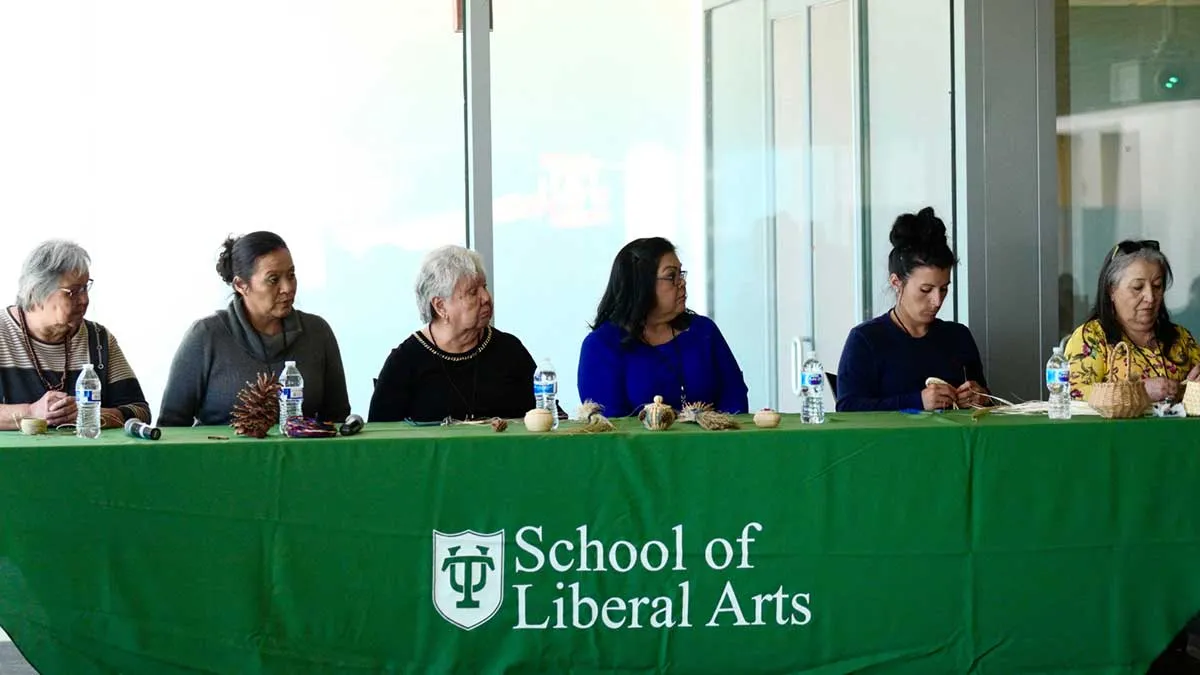The aim of the Tulane Gulf South Indigenous Studies Symposium (TGSISS) is to elevate the knowledge of Indigenous Peoples and Indigenous life in the Gulf South on Tulane University’s campus. The symposium focuses on Indigenous Peoples of the Gulf South, but considers larger tribal networks and Indigeneity, broadly. Speakers include artists, activists, scholars, researchers, and culture bearers. NOCGS works collaboratively with the Indigenous Nations of this region in planning the symposium, involving Program Committee members from different tribes.
4th Annual NOCGS Indigenous Symposium
3rd Annual NOCGS Indigenous Symposium
The 3rd Annual NOCGS Indigenous Symposium took place on March 12, 2021 from 9am-5:30pm. Please visit the symposium website for the full schedule and presenter bios: https://indigenoussymposium.tulane.edu/
2nd Annual NOCGS Indigenous Symposium

The New Orleans Center for the Gulf South held the 2nd Annual Indigenous Symposium on Tuesday, April 2 from 8:30am – 5:30pm in the Qatar Ballroom on Tulane’s Uptown Campus.
Featured speakers and panels discussed methods of resistance that include a territorial acknowledgement, archaeology, foodways, a social activist roundtable, a cultural demonstration, and a presentation of new research from various scholars. Featured keynote speaker Dr. N. Bruce Duthu presented Tribal Sovereignty and Juridical Spaces: Tribal Lands as Domains of Self-Determination, Subsistence and the Sacred . Tribal representation included: Atakapa-Ishak, Coushatta Tribe of Louisiana, Rosebud Sioux Tribe, United Houma Nation, Isle de Jean Charles Band, Biloxi-Chitimacha-Choctaw, Diné Nation and Pointe-au-Chien Indian Tribe.
Sovereignty is the full right and power of a governing body over itself, without any interference from outside sources or bodies. The colonial history of the gulf south region is fraught with infractions to the sovereignty of Indigenous governance, land rights and physical bodies. Disputed territories, extraction of wealth and minerals from the earth and water, sugar and cotton antebellum plantation monopolies and rebellions throughout the circum-Caribbean and in the gulf south all characterize a region where the personal sovereignty of human bodies and the natural world were consistently at risk. Despite concerted harm to Indigenous bodies and minds, and decimation of the natural landscape and further isolation and dispersal of Native populations, gulf south Indigenous communities continue to persist, nurture, and fight for sovereignty.
Inaugural NOCGS Indigenous Symposium at Tulane
Opening Remarks
Rebecca Snedeker, Co-Chair, New Orleans Center for the Gulf South, Tulane University
Pierre Geny, Académie des Sciences d’Outre Mer
Denis Vialou, Académie des Sciences d’Outre Mer
Landscape: Delta Geography: Resources and Opportunities in a Dynamic Environment, 7200 to 300 Years Before Present
Richard Campanella, Tulane University
Archaeology: Stories of What Lies Beneath the Land and the Sea, Collaboration between Tribes and Archaeologists
Moderator: Laura D. Kelley, Co-Chair, Tulane University
Panel: John Barbry, Tunica-Biloxi Tribe of Louisiana Chris Rodning, Tulane University Dave Watt, Tulane University
History: French Dreams and Indigenous Designs: How Native People Shaped the Development of Early Louisiana
Elizabeth Ellis, New York University, Citizen of Peoria Tribe of Indians of Oklahoma
Soundscape: Indigenous Contributions to the Musical Heritage of Louisiana
Indigenous Musical Traditions and Cultural Interactions in Colonial Louisiana
Shane Lief, Tulane University
Bulbancha Is Still a Place: Decolonizing the Narrative of New Orleans
Jeffery U. Darensbourg, Tribal Councilperson & Head of the Alligator Band, Atakapa- Ishak Nation
Foodways: Seeds and Sovereignty
Monique Verdin, United Houma Nation, New Orleans Center for the Gulf South, Visiting Artist
Afternoon Opening Remarks
Laura D. Kelley, Co-Chair, Tulane University
Academy Remarks: L’Imaginaire Français et les Amerindiens de Louisiane
Senator Jacques Legendre, Académie des Sciences d’Outre Mer
Contemporary Issues: High Water/High Stakes: Cultural Heritage and Legal Hurdles
Patty Ferguson-Bohnee, Sandra Day O’Connor College of Law, Arizona State University, Pointe-au-Chien Indian Tribe Presentation in French and English
Roundtable: Long Memories of Living People: Cultural Heritage and Place
Moderator: Nathalie Dajko, Tulane University
Translator: Nathalie Clarke, Tulane University
French:
Theresa Dardar, Pointe-au-Chien Indian Tribe
Chief Albert Naquin, Isle de Jean Charles Band, Biloxi-Chitimacha-Choctaw Tribe
Donna Pierite, Tunica-Biloxi Tribe of Louisiana
English:
Principal Chief Thomas Dardar, Jr., United Houma Nation
Jeffery U. Darensbourg, Alligator Band, Atakapa-Ishak Nation
Ongoing Projects: Research and Engagement Opportunities
Looking Forward to Preserve the Past and to Nourish the Present
Laura D. Kelley, Tulane University
Matthew Bethel, Sea Grant, Louisiana State University
Dorothy Cheruiyot & Emily Farrer, Tulane University
Sunshine Best, Tulane University
Elisabeth Mora & Andrew Abdalian, Tunica Biloxi Language Program
Amy Lesen & Chief Albert Naquin, Tulane University & Isle de Jean Charles Band
Closing Remarks Afternoon Session
Rebecca Snedeker, Co-Chair, New Orleans Center for the Gulf South, Tulane University


